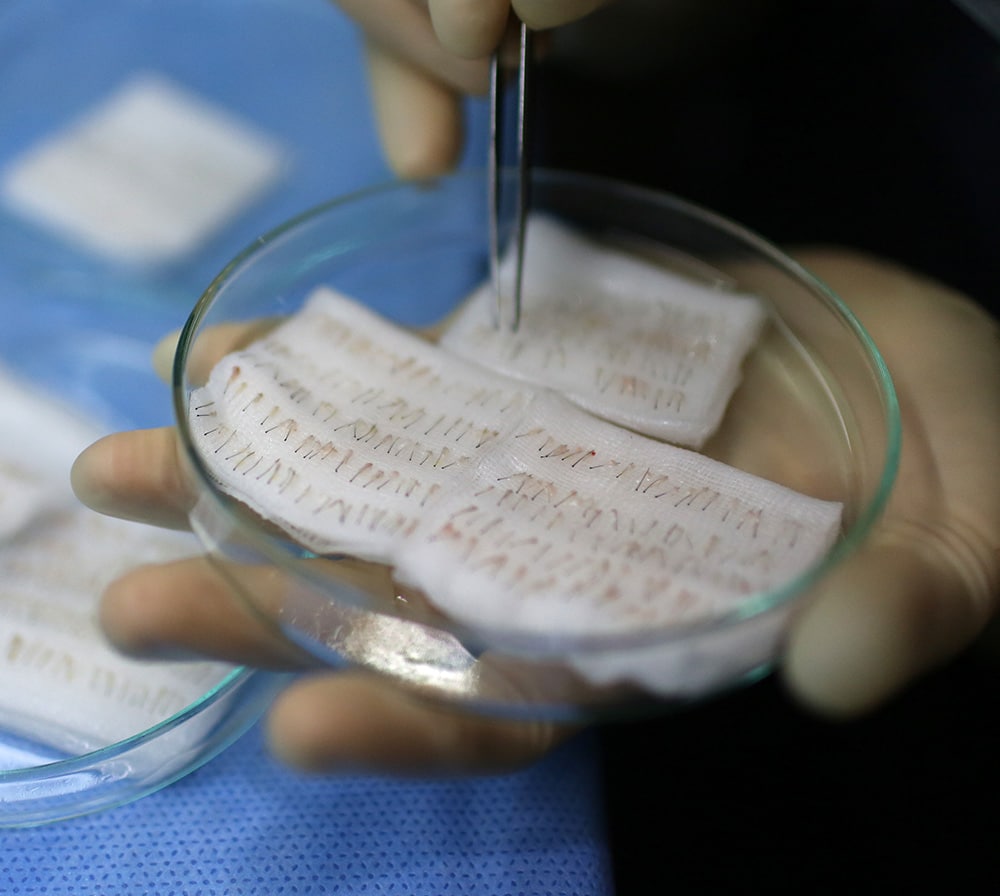What is Hair Transplantation?
From baldness to density
Hair Transplant surgery is a cosmetic procedure aimed at resolving the issue of baldness, compensating for hair loss to return the patient’s scalp to its previous state and appearance.


Overview
of the Procedure
- Prior to the transplant, the patient’s head is shaved entirely to facilitate extraction of the hair follicles and their replantation into less dense, bare/balding areas.
- The surgeon will define the transplant areas by drawing a line outlining them.
- The donor area is then anesthetised, and the follicles extracted using the advanced “FUE” technology, to be placed in a preservative environment. Afterwards, the treated areas are bandaged.
- After numbing the balding area, the surgeon will open a number of channels (corresponding to the number of extracted follicles) on the scalp surface through tiny needle punctures in the selected area, to which the hair follicles are then transferred as per the predetermined surgery plan and illustrations.
- The follicles are planted at a particular angle corresponding to the direction of hair inclination, thus covering all balding areas with the maximum possible density.
- The Hair Transplant surgery is performed using specialised needles with a diameter of one millimetre or less. Hair follicles are removed with a micrografting device from the donor area where hair follicles are genetically resistant to falling.
Anesthesia:
Local anesthesia is required only for the donor area and the area to be transplanted.
Duration of Stay:
The patient must remain in Istanbul after the surgery for a period of three days for all transplant operations.



Post-Op:
- Stages of post-op hair growth: approximately 20 days (3 weeks) after the surgery and up to 6 weeks post-op, hair will fall at an unlimited rate. Bear in mind, this will be the hair falling, not the follicles themselves. The rate will vary on an individual basis, this loss is considered a normal and healthy effect/condition. Around the 3-month mark, the hair will start to grow back slightly at first, with increasing length every month to follow.
- In the sixth month following the operation, hair growth will generally reach a 50% capacity of the final results. This percentage will reach 75% in the eighth month, and 100% at the one year / 14 months post-op mark.
Important
Instructions and Aftercare for Pre and Post-Hair Transplants
- Stopping the intake of any vitamins or dietary supplements, as well as refraining from drinking green tea or taking any blood thinners such as Aspirin, one week prior to the surgery (check with your doctor/GP).
- Reducing (preferably refraining from) smoking one week prior to the surgery.
- Refraining from alcohol consumption at least one week prior to the surgery.
- Stopping the use of any medical or cosmetic ointments, lotions, or creams that affect hair-growth one week prior to the surgery.
- On the day of the operation, the patient is advised to wear comfortable clothes, preferably a buttoned shirt for ease of dressing and undressing.
- The patient is advised to consume a healthy and filling breakfast on the day of the operation.
- Refraining from getting a haircut before the operation, as this will be done at the hospital.
- Carrying the full surgery cost in cash (USD or EUR).
- Carrying one’s passport on both the consultation and operation days.
- Please inform your personal medical consultant within the Royal Shape team in case of any medical updates prior to the surgery.
- For a period of four days following the operation, make sure not to tilt your head forward/down. Prayer can be done sitting down for the first 6 days post-op.
- Refraining from touching or feeling the transplant area, being mindful of it and ensuring that it remains completely untouched.
- Any straining/aggressive physical activities and heavy energy exertion (such as long walks and intimate activities) are strictly prohibited for 6 days post-op.
- Avoiding direct sunlight and rain over the head and using an umbrella to protect the affected area.
- Consuming a lot of fluids.
- Using the provided medical sleeping pillow for a period of 6 days post-op.
- Committing to the prescribed medication regimen on a regular basis, which is:
- Cipro anti-inflammatory pills: 1 morning pill and 1 evening pill, after food.
- Prednol pills to be taken after breakfast as such: 2 pills on the 1st day, 2 on the 2nd day, and a pill on each of the 3rd and 4th days.
- Parol painkiller pills: only if necessary.
- Using our prescribed shampoo on a regular basis.
- Refraining from using any type of chemical product or heat on the hair for a minimum of one year post-op (such as shampoo, cream/lotion/ointment/gel, dye, blow-dryer etc…)
- If the patient feels the need for any hair-nutrient vitamins or supplements following the operation, it is preferable to use those prescribed by the medical consultant after 1 month / 6 weeks have passed.
- Refraining from using any spray or vitamins without consulting the personal medical consultant, in order to avoid using any brands/products containing chemical components harmful to the transplanted hair.
- A month / 6 weeks after the surgery, the patient must perform thorough full scalp massages using the palms / fingertips (not the nails).
- Five months after the surgery, the patient can start to style the hair back for example, to give it a particular direction and improved aesthetic.
- The patient is advised not to neglect the transplanted hair and commit to the proper aftercare routine and instructions.
- Stages of post-op hair growth: approximately 20 days (3 weeks) after the surgery and up to 6 weeks post-op, hair will fall at an unlimited rate. Bear in mind, this will be the hair falling, not the follicles themselves. The rate will vary on an individual basis, this loss is considered a normal and healthy effect/condition. Around the 3-month mark, the hair will start to grow back slightly at first, with increasing length every month to follow.
- In the sixth month following the operation, hair growth will generally reach a 50% capacity of the final results. This percentage will reach 75% in the eighth month, and 100% at the one year / 14 months post-op mark.
- Kindly provide regular post-op photos upon request of the medical consultant or the follow-up department.
Your case will be monitored by the medical follow-up department on a monthly basis following the operation for a full year to ensure adherence to instructions for the best results.



